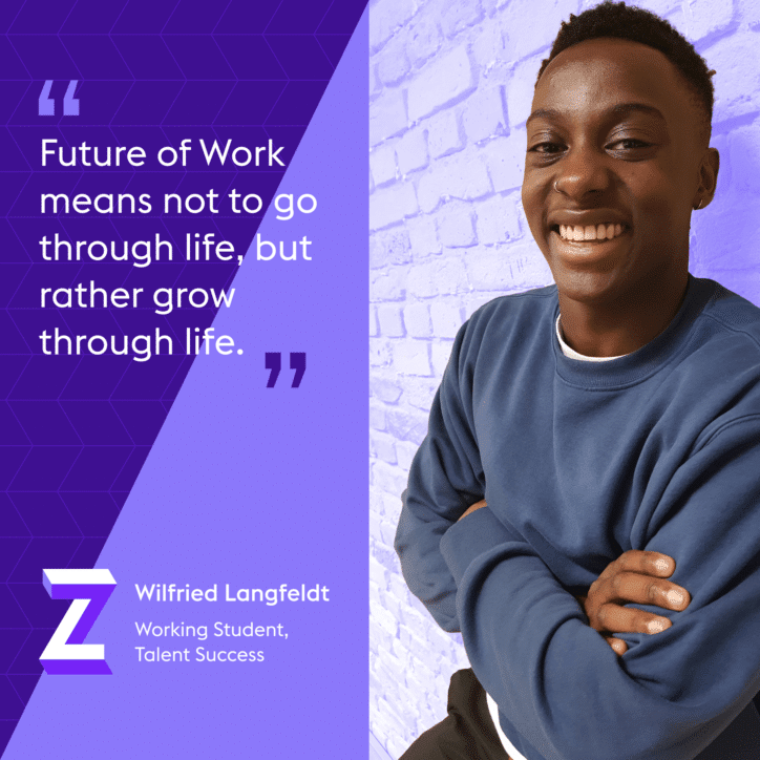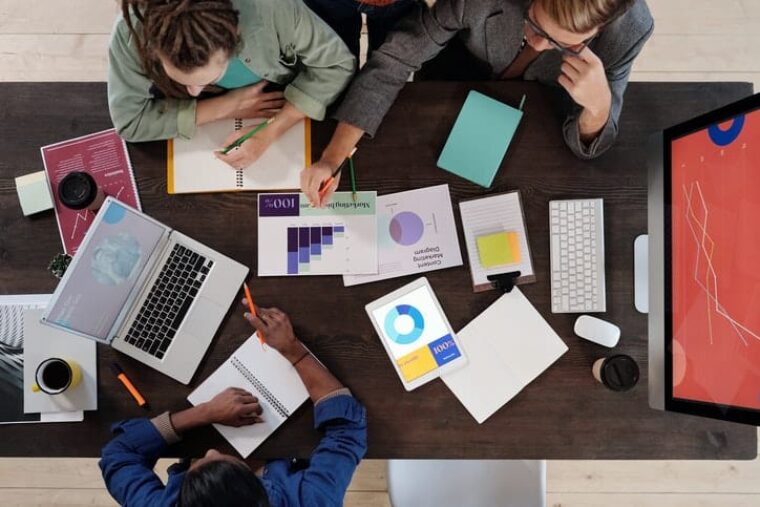Talent Success Working Student Will talks about the Future of Work

The Future of Work is what we make of it. That’s why we talk to our colleagues on a regular basis. We want to know what their everyday working lives are like, what they expect from the world of work, and how they imagine the working world of tomorrow. What role does digitalisation play? As a bonus, we also get very personal insights into the everyday lives of our colleagues. Read all about them and their views on the Future of Work in these interviews.
Will is one of the Working Students in the Talent Success team at Zenjob. For Will a key understanding relating to the Future of Work is being open to adapt to work alongside technological progress and acquire new skill sets. What has changed specifically in his role and what trends can already be observed in the working life?
What did you want to be when you grew up?
I wanted to become a veterinarian. Now, this is kind of funny as I’m not into animals anymore, because I got bitten by a dog once. Even though I’m not scared of dogs I still have huge respect for them.
What has changed and what is your current job?
After my long journey of travelling I wanted to do something else which might also benefit me in the future. I needed a temporary job and thus I stumbled over Zenjob. Luckily I was hired soon after I had my interview. It was the Onboarding department where I started working and began onboarding our Talents.

The Onboarding department has developed into a much more tech driven and progressively digitalised division. How do you think technology will change your job in the future?
Well, this is a big question. I can say for sure that technology will change the way I work, not necessarily my work itself. Nonetheless it will reduce some duties and tasks, but will also expand on the other side the need for others. I can imagine working with AI or machines. Even though I can’t really fully imagine it yet, it is something very interesting and definitely to come. We need to adapt and work alongside technological processes and acquire a new skill set.
Are you afraid that a machine will take over your job?
Hmm, I was in the beginning, because I used to do physical onboarding. My job was to talk to people face-to-face everyday. Things change, but not necessarily for the worse. I mean, we had asynchronous and in person onboarding but now we only offer remote onboarding. So there are new fields and new job opportunities in the making and they are going to be big as well. I might have lost the opportunity to do face-to-face onboarding, but as I said: I need to adapt. Life has always been about adapting.
There is a quote from Charles Darwin: “It is not the strongest of the species that survives, nor the most intelligent, but the one most responsive to change.” That was what came to my mind when we talked about being progressive. I mean, the future is now and we have to bring this topic up. We need to communicate this maybe also in schools or universities. I am 22 years old now and I just stumbled over this big topic recently, which kind of scares me. If you imagine someone working their whole life in construction or doing something with their hands and then suddenly the world changes. It is so hard to learn something new. I think people are really concerned about this digitalisation. To adapt better, we definitely need to communicate more openly. This way we won’t just go through life, but rather grow through life!

What are your hopes regarding digitalisation?
My hope is that I still have the ability to be creative. I don’t see myself in a 9-5 job, where I’ll be doing the same tasks over and over again every day. Likewise I don’t want to get stuck in a routine that doesn’t really suit me. Hopefully machines or technology will also make it easier to work and that it will increase opportunities. If we look back over the years and think about the changes over the past 250 years like electricity or steam. These changes might not be as significant as the changes over the past 15 years. Searching for something on the internet or surfing the web. I remember I had a very bad phone and when you accidentally pressed the internet button you were charged 20 Euros. Today we have memes and GIFs and everyday something else is coming.
We have big data sources and data is for everyone. It is knowledge which is just there and you can grab it. But there are still not a lot of people who can code or fully utilise all the information available for them. I hope that there will be the opportunity to learn that and to have transparency as well. This way all the concerns and doubts won’t be reasonable anymore. One of my biggest hopes is that young people get involved more, because it is about us.
Do you have any concerns when you think about digitalisation?
Yes. There are machines out there that can do specific patterns much more precisely than humans ever will. Which is kind of frightening. It is scary that there is a robot doing the same task as you do, but much better, and much more efficient. Of course you will be asking yourself: will I be of use in the future? But as I said: we need to adapt.

How much has changed in your job during your time at Zenjob? How much do digitalisation processes help you save time in your work life?
A lot of time. I work in a digital start-up so it was always certain that we were going to take the step to only offer remote onboarding. Working towards the goal to become more and more digital I thought that I was working towards my unemployment. However, there are so many more things to do. I remember explaining over and over again our General Agreements and now the Talents are signing it online without any problems. This is crazy because a year ago this was not imaginable. Students come in and they think it is natural, as if it has always been like this. If you want to work very efficiently – time is the strongest value I think – and I think working with so many tools makes my life easier.
How would you like to work in the future? What does digitalisation in the context of the future of work mean to you?
I will use the example of my flatmate because he is working as a web developer and App developer. And he has the ability to work from any place in the world. This is crazy for me, I’d love to see myself working maybe in some Asian country. Imagine how cool it would be to talk to someone from somewhere around the world, maybe having a Pina Colada in your hand, while also working. Technology makes this future a possibility.
Interesting, right? You might also want to read about Martin’s point of view on the Future of Work.